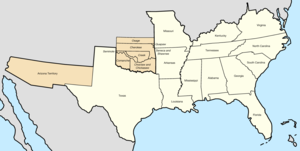| Georgia | |
|---|---|
 Map of the Confederate States | |
| Capital | Milledgeville |
| Largest city | Savannah |
| Admitted to the Confederacy | March 16, 1861 (2nd) |
| Population |
|
| Forces supplied |
|
| Major garrisons/armories | Fort Pulaski |
| Governor | Joseph E. Brown |
| Senators | Benjamin Harvey Hill John Wood Lewis, Sr. Herschel Vespasian Johnson |
| Representatives | List |
| Restored to the Union | July 15, 1870 |
| History of the State of Georgia |
|---|
 |
|
|
|

 |
|
Confederate States in the American Civil War |
|---|
|
|
| Dual governments |
| Territory |
|
Allied tribes in Indian Territory |
Georgia was one of the original seven slave states that formed the Confederate States of America in February 1861, triggering the U.S. Civil War. The state governor, Democrat Joseph E. Brown, wanted locally raised troops to be used only for the defense of Georgia, in defiance of Confederate president Jefferson Davis, who wanted to deploy them on other battlefronts. When the Union blockade prevented Georgia from exporting its plentiful cotton in exchange for key imports, Brown ordered farmers to grow food instead, but the breakdown of transport systems led to desperate shortages.
There was not much fighting in Georgia until September 1863, when Confederates under Braxton Bragg defeated William S. Rosecrans at Chickamauga Creek. In May 1864, William T. Sherman started pursuing the Confederates towards Atlanta, which he captured in September, in advance of his March to the Sea. This six-week campaign destroyed much of the civilian infrastructure of Georgia, decisively shortening the war. When news of the march reached Robert E. Lee's army in Virginia, whole Georgian regiments deserted, feeling they were needed at home. The Battle of Columbus, fought on the Georgia-Alabama border on April 16, 1865, is reckoned by some criteria to have been the last battle of the war.
Cite error: There are <ref group=FN> tags on this page, but the references will not show without a {{reflist|group=FN}} template (see the help page).
- ^ Civil War in Georgia: Overview. New Georgia Encyclopedia. Retrieved January 29, 2021.

